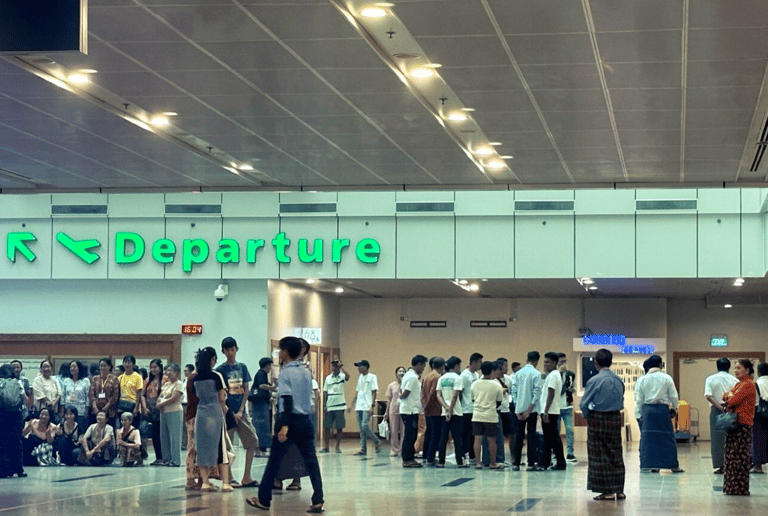WELCOME TO 1 ACHIEVE MAID AGENCY SINGAPORE I MAID AGENCY SG
Myanmar Domestic Worker prevented to come to Singapore
Myanmar's military junta has intensified its efforts to control the movement of young people leaving the country, particularly through Yangon International Airport.
ESSENTIAL KNOWLEDGE
Bryan
8/27/20243 min read
Myanmar's Escalating Struggle: Conscription and Restricted Exits
The situation in Myanmar continues to deteriorate under the military junta's oppressive rule, with recent developments highlighting the regime's increasingly desperate attempts to control its population. The junta has implemented stricter measures at Yangon International Airport, particularly targeting young adults attempting to leave the country. This move is primarily driven by the junta's need to reinforce its military ranks amid a growing civil war and economic collapse, exacerbated by international sanctions and internal unrest.
Conscription and Military Desperation
Since the military coup in February 2021, Myanmar has faced widespread civil disobedience and armed resistance. In response, the junta has resorted to compulsory military conscription, targeting men aged 18 to 35 and women aged 18 to 27. This law, enacted in February 2024, requires citizens to serve a minimum of two years in the military. The conscription law has caused widespread fear among the youth, who are now desperate to avoid military service, often referred to as a "death sentence" due to the high mortality rates among conscripts sent to the frontlines.
Young people, particularly men, have increasingly sought ways to flee the country, either by crossing borders into neighboring countries or flying out of Yangon. However, the junta has tightened its grip on those attempting to leave. Reports indicate that since August 1, 2024, many youths have been barred from boarding their flights at Yangon International Airport, even if they possess all the necessary documentation.
Airport Restrictions and the Impact on Youth
The junta's airport restrictions have primarily targeted those holding "Passport for Job" (PJ) documents, which are typically issued to those seeking employment abroad. These individuals, often aged between 23 and 32, have been denied departure due to "inadequate documents," despite holding valid passports and visas. On some occasions, even women have been blocked from leaving, marking a significant escalation in the junta's restrictive measures.
The junta's actions have created a climate of fear and uncertainty, with many young people turning to illegal methods to escape conscription. Smuggling networks and illegal agencies have become more active, exploiting the desperation of those trying to flee. This has not only increased the risks for those attempting to leave the country but has also led to a surge in human trafficking cases.
The junta's crackdown on airport departures is part of a broader strategy to control the population and ensure a steady supply of conscripts. The military's need for personnel is dire, as evidenced by reports of poorly trained conscripts being sent to the frontlines with little regard for their survival. Families across Myanmar are increasingly concerned for the safety of their children, many of whom have been reported missing or killed in action.
The Human Cost and International Response
The human cost of the junta's policies is immense. The crackdown on airport departures is just one facet of a broader campaign of repression that includes widespread human rights abuses, arbitrary arrests, and extrajudicial killings. The junta's actions have drawn international condemnation, with calls for increased sanctions and humanitarian interventions. However, the junta remains defiant, continuing to prioritize its survival over the well-being of its citizens.
The situation in Myanmar highlights the challenges faced by the international community in addressing the crisis. While sanctions have had some impact on the junta's ability to govern, they have also contributed to the country's economic collapse, exacerbating the suffering of ordinary citizens. The junta's control over the military and security forces remains strong, making it difficult for opposition groups to gain ground.
Conclusion: A Nation in Peril
Myanmar is at a critical juncture. The junta's increasingly desperate measures to control the population and maintain its grip on power have plunged the country into chaos. The conscription drive and the restrictions on airport departures are just the latest in a series of oppressive policies that have left the country's youth with few options. For many, fleeing the country is the only way to avoid conscription and the almost certain death that awaits them on the frontlines. However, with the junta tightening its noose around those attempting to leave, the future for Myanmar's youth looks increasingly bleak.
As the international community continues to grapple with how to respond to the crisis in Myanmar, the junta's actions serve as a stark reminder of the lengths to which authoritarian regimes will go to maintain power. The people of Myanmar are paying a heavy price for the junta's desperation, and without significant international intervention, the situation is likely to deteriorate further.
This article sheds light on the dire situation in Myanmar, highlighting the junta's conscription policies and the severe restrictions on young people attempting to flee the country. The ongoing crisis underscores the urgent need for international attention and action to address the human rights abuses occurring in Myanmar.
---
This blog combines information from multiple sources, ensuring a comprehensive and original perspective on the current situation in Myanmar.
Credits and Sources:
Radio Free Asia
Mizzima News
Myanmar Now (images)


Myanmar’s Junta Tightens Conscription Noose at Airports: A Growing Crisis
Understand the situation and how does this impacts the manpower situation in Myanmar.
1 Achieve Employment Pte. Ltd.
License: 23C1900 UEN: 202316873N
Contacts
enquiries@1achieve.net
+6592259222


